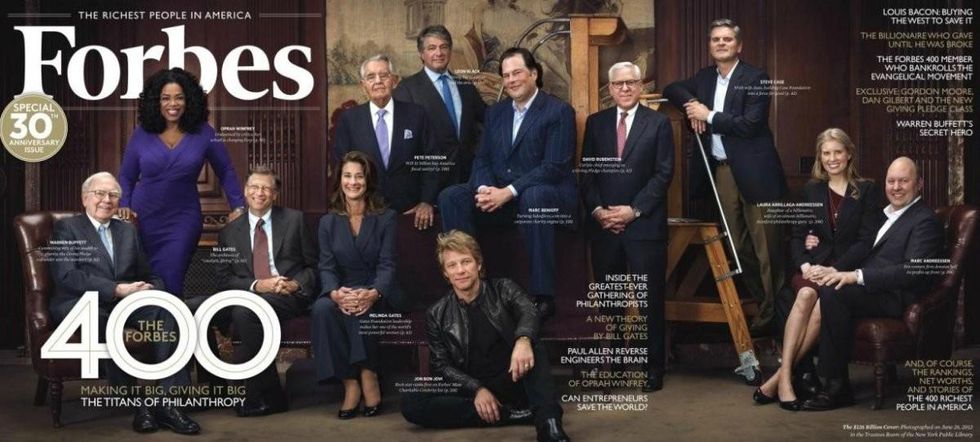Gushing over the wild financial wealth of individuals,
The Forbes 400: The Richest People In America In 2012 -- released today online and heading to newstands nationwide--pays homage to the cliched platitude that America is the land of opportunity for hard-working, gutsy entrepreneurs and great wealth is merely evidence of great accomplishment.
Unfortunately, according to a new report by Massachusetts-based United for a Fair Economy, the Forbes 400 does not tell the whole story of wealth in America. In fact, the authors of the report argue, the list of the country's richest people tells the story of a nation where being born into wealth or inheriting great sums from a departed spouse are by far the most common paths to financial fortune.
Taking a close look at last year's list of wealthiest people, the UFE discovered that roughly 40% of the individuals who appeared on the 2011 Forbes list received a "significant economic advantage in their lives by inheriting a sizeable asset from a spouse or family member." Strikingly, more than 20% received sufficient wealth to make the list from this inheritance alone.
Timed to coincide with this year's list from Forbes, the UFE report, Born on Third Base: What the Forbes 400 Really Says About Economic Equality and Opportunity in America (pdf), seeks to show that the highly-touted list actually misleads about the sources of wealth and opportunity for many of those who appear on it.
"Each story calculatedly glamorizes the myth of the 'self-made man' while minimizing the many other factors that enable wealth, such as tax policies, other government policies that favor the wealthy, and the importance of being born to the right family, gender and race."
Forbes claims that their list of the 400 richest people is 'the definitive scorecard of wealth' in the United States, but UFE rebuffs that assertion, saying that the narrative of wealth and achievement pushed by Forbes ignores the other side of the coin-- namely, that the opportunity to build wealth is not equally or broadly shared in contempory society.
According to the report:
- The net worth of the Forbes 400 grew fifteen-fold between the launch of the list in 1982 and 2011, while wealth stagnated for the average U.S. household.
- The racial wealth divide is starkly apparent from the overwhelming whiteness of the list. The 2011 Forbes 400 had only one African American member.
- Women accounted for just 10% of the 2011 list, and of the women on the list nearly 90% inherited their fortunes.
In addition, the report points out that (and the new 2012 list from Forbes shows continuation of this trend) the rich in 2011 got richer as the poor got poorer. The growing wealth inequality, the report says, is not due to any inherent brilliance or dynamism of the wealthy, but because of carefully crafted policy and legislative reforms enacted by government at the behest of the these same individuals.
Two examples cited by the report which directly impact the ability of the rich to retain and pass along their enormous assets:
- Tax rates on capital gains have been slashed, which especially benefits members of the Forbes list. The richest 0.1% receive half of all net increases in capital gains.
- Drastic cuts to the federal estate tax passed in the Bush tax cuts and the 2010 Obama tax deal allow the Forbes 400 to pass on more of their massive fortunes to their heirs, contributing to the growth of inequality and entrenching a class of super-wealthy heirs.
For its part, and despite the critical tone of the report, United for a Fair Economy says its efforts are not an attempt to "shame or belittle wealth or success."
"Instead," the authors maintain, "we aim to ask why certain representative individuals are on the list in order to reach a better understanding of wealth in the US. Such questions should lead to an important conversation about economic mobility, as well as the rules and loopholes that allow people to create wealth in the first place."
Check out the 'Born on Third Base' tumblr page, where some of the Forbes 400 make the All-Star Team. Read the full report here.
# # #

